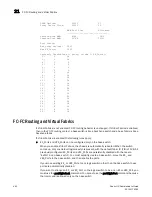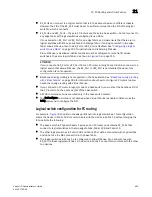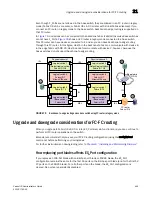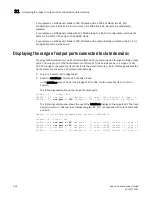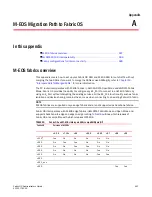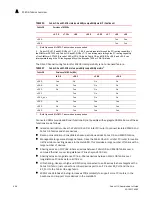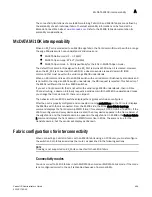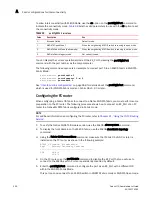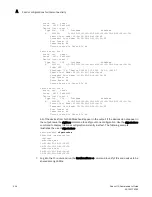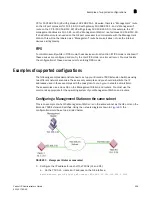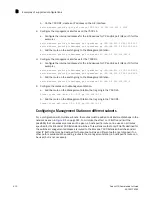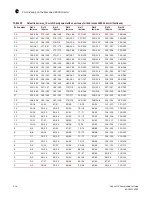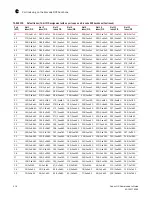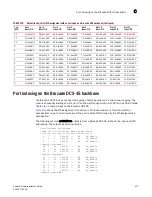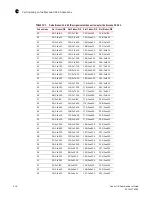
Fabric OS Administrator’s Guide
505
53-1001763-02
Appendix
B
Inband Management
In this appendix
•
Inband Management overview . . . . . . . . . . . . . . . . . . . . . . . . . . . . . . . . . . . 505
•
Internal Ethernet devices . . . . . . . . . . . . . . . . . . . . . . . . . . . . . . . . . . . . . . . 506
•
IP address and routing management. . . . . . . . . . . . . . . . . . . . . . . . . . . . . . 506
•
Examples of supported configurations . . . . . . . . . . . . . . . . . . . . . . . . . . . . 509
Inband Management overview
Inband Management on the Brocade 7500 Extension Switch allows a management station to
communicate to the CP through the GE ports for tasks such as downloading firmware, SNMP
polling, SNMP traps, troubleshooting, and configuration. To facilitate this communication, the
Brocade 7500 Extension Switch uses IP forwarding and IP routing to forward IP traffic through the
switch to the management station.
NOTE
You can have an FCIP tunnel set up and running on one GE port, while the other is being used for
Inband Management. Or, you can use both GE ports for Inband Management.
Inband Management is implemented on the Brocade 7500 Extension Switch only and is not
available on the FR4-18i blades. It requires having management access to the switch through the
management port for initial configuration. There must be at least one IP interface configured, on
the GE port you will use, for Inband Management.
To implement Inband Management on the Brocade 7500 Extension Switch, you must have an
understanding of implementing IP routes and subnets. The GE port that you configure acts as a
router with IP forwarding implemented to allow communication to the CP through the GE port
processors and then out the GE ports. Therefore, it is necessary to implement numerous IP routes
throughout the network to allow the communication to take place.
NOTE
IPsec is not supported over Inband Management interfaces.
Once the switch is set up with the appropriate IP addresses and routes, the IP driver will compare
the destination address to any existing interfaces when it receives an IP packet. If it does not have
an interface that matches, it will perform a route lookup for the destination address. If it returns
with a valid gateway, the packet will be forwarded to that gateway address.
NOTE
Only IPv4 forwarding is supported.
Summary of Contents for 53-1001763-02
Page 1: ...53 1001763 02 13 September 2010 Fabric OS Administrator s Guide Supporting Fabric OS v6 4 0 ...
Page 4: ...iv Fabric OS Administrator s Guide 53 1001763 02 ...
Page 24: ...xxiv Fabric OS Administrator s Guide 53 1001763 02 ...
Page 28: ...xxviii Fabric OS Administrator s Guide 53 1001763 02 ...
Page 32: ...xxxii Fabric OS Administrator s Guide 53 1001763 02 ...
Page 40: ...xl Fabric OS Administrator s Guide 53 1001763 02 ...
Page 42: ...2 Fabric OS Administrator s Guide 53 1001763 02 ...
Page 54: ...14 Fabric OS Administrator s Guide 53 1001763 02 High availability of daemon processes 1 ...
Page 74: ...34 Fabric OS Administrator s Guide 53 1001763 02 Basic connections 2 ...
Page 102: ...62 Fabric OS Administrator s Guide 53 1001763 02 Audit log configuration 3 ...
Page 214: ...174 Fabric OS Administrator s Guide 53 1001763 02 Management interface security 7 ...
Page 228: ...188 Fabric OS Administrator s Guide 53 1001763 02 Brocade configuration form 8 ...
Page 276: ...236 Fabric OS Administrator s Guide 53 1001763 02 Creating a logical fabric using XISLs 10 ...
Page 404: ...364 Fabric OS Administrator s Guide 53 1001763 02 ...
Page 440: ...400 Fabric OS Administrator s Guide 53 1001763 02 Performance data collection 17 ...
Page 480: ...440 Fabric OS Administrator s Guide 53 1001763 02 F_Port masterless trunking 19 ...
Page 494: ...454 Fabric OS Administrator s Guide 53 1001763 02 Buffer credit recovery 20 ...
Page 574: ...534 Fabric OS Administrator s Guide 53 1001763 02 Hexadecimal overview E ...


